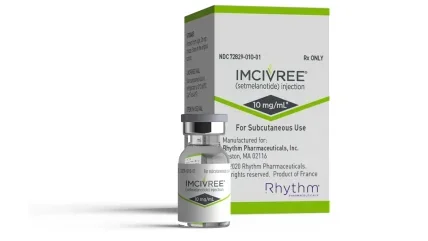
Rhythm Pharmaceuticals has announced that the US Food and Drug Administration (FDA) has approved an expanded indication for Imcivree (setmelanotide) to include children as young as two years old.
Imcivree is approved to reduce excess body weight and maintain long-term weight reduction in patients with syndromic or monogenic obesity. This includes those with Bardet-Biedl syndrome (BBS) or genetically confirmed pro-opiomelanocortin (POMC), including proprotein convertase subtilisin/kexin type 1 (PCSK1), deficiency or leptin receptor (LEPR) deficiency.
Imcivree is the first and only precision medicine targeting the hypothalamic melanocortin-4 receptor (MC4R) pathway, a root cause of hyperphagia and obesity.
It is approved for use in adults and children as young as 2 years old in the US and Europe.
Boston-based commercial-stage biopharmaceutical company said setmelanotide has delivered significant, sustained reductions in weight and hunger in clinical trials.
In August this year, FDA accepted the supplemental new drug application (sNDA) of Rhythm Pharmaceuticals to expand indications of Imcivree.
In the same month, the European Commission approved setmelanotide for use in patients as young as two years old.
Recently, the drug gained marketing authorisation from the UK’s Medicines & Healthcare products Regulatory Agency (MHRA) for the same expanded indication.
Rhythm Pharmaceuticals chairman, president and CEO David Meeker said: “Rhythm is focused on ensuring patients with these rare genetic diseases that are present at birth and manifest early in life have access to Imcivree as soon as possible.
“We remain steadfast in our commitment to continue rapidly advancing care and precision medicines that address the root cause of rare neuroendocrine diseases.”
Imcivree was first FDA-approved in November 2020 for patients six and older with POMC, PCSK1, or LEPR deficiencies.
It received additional approval in June 2022 for patients with BBS.
Rhythm Pharmaceuticals is also advancing a broad clinical programme for setmelanotide in rare diseases, along with RM-718 and investigational MC4R agonists LB54640, which was acquired through a global licensing agreement with South Korean life sciences company LG Chem.
The biopharmaceutical company is also developing small molecules for congenital hyperinsulinism.






